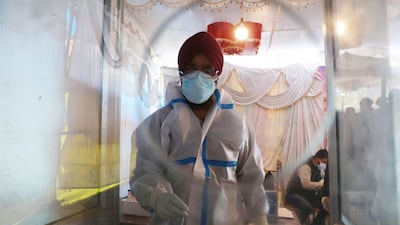India’s laboratories are struggling to deal with an influx of coronavirus test requests as the country tackles record-breaking numbers of infections and deaths each day.
Thousands of anxious people every day are rushing to book appointments with labs and hospitals for tests to find out whether they have contracted the deadly virus.
India has had a record-breaking number of infection cases during its second wave, with the country’s total caseload passing 18.3 million, the second highest after the US.
More than 200,000 people have died and many health experts say the official numbers are the tip of the iceberg.
On Tuesday, the nation of 1.3 billion recorded more than 362,000 new Covid-19 cases out of nearly 1.7 million people tested.
It also recorded the highest single day of deaths, with nearly 3,300.
The increase in infections has fuelled a rush on testing, leading to an acute shortage of testing material and a huge backlog.
Laboratories are taking up to a week to collect swabs and longer to provide test results, particularly the highly sought after reverse transcription-polymerase chain reaction (RT-PCR) test, with many customers fuming over delays.
Some private labs are collecting 2,500 swab samples a day as they deal with a backlog of thousands of cases.
"There is a sudden surge in demand for RT-PCR tests since April 10 but we are unable to take samples for the test because of a huge backlog," Mohammad Bilal, 25, a sample collector at Radcliff Lifetech in northern Noida city, told The National.
"People get furious and even come to our homes for reports because they need medication.”
Health sources say the demand has tripled in the past two weeks after the country witnessed a sharp rise in infection cases along with the regular demand of Covid-19 negative certificates for domestic and international travel.
Dr Arjun Dang, associate lab director and consultant at Dr Dang Labs in New Delhi, said calls have increased threefold compared to the peak last year. and they are receiving more than 100 bookings a minute.
"Since the past week we have been flooded with requests because of a surge in the cases, and also as travel has opened and many hospitals also ask for a mandatory RT-PCR test prior to admission," Dr Dang told The National.
“We have three drive-through centres and home-collection services. In the peak time, we would open it for one to three hours but now we have been only able to open it for a few minutes.
"Even though we work on 200 per cent capacity it is so bad that we get overwhelmed with bookings."
The labs are also facing a shortage of essential reagents for certain blood tests.
Dr Dang said the lab had to discontinue the tests for two days because no new stock was coming in.
"These tests dictate management and to an extent the prognosis of Covid patients but because of the surge, there is a shortage of reagents for these tests,” he said.
India has conducted about 280 million tests since the pandemic outbreak last January, the country's Health Ministry said, amid criticism that its testing rate was severely low.
A parliamentary panel on health last November said that low testing could have played a vital role in the initial outbreak of the pandemic.
New Delhi has increased its testing rates after allowing private companies to conduct coronavirus tests, local reports and social media users claim that several state governments are forcing private companies to halt testing.
In the capital New Delhi, a city of 21 million where one out of three people tested has coronavirus, testing rates dropped on Monday from nearly 80,000 to 58,000.
States including Uttar Pradesh, Bihar and Madhya Pradesh have also been accused of reducing testing to show smaller infection rates.
"India's daily testing has been significantly lower than what is desired. The average daily new cases in India have more than tripled compared to their previous peak while the average daily testing has not even doubled," Rijo M John, Adjunct Professor at Rajagiri College of Social Sciences in Kochi, told The National.
“As a result, the test positivity rate has been soaring and is currently at 21 per cent at the national level with several states having close to 30 per cent or higher daily TPRs. This is suggestive of the fact that India is missing out on counting a lot of cases out there which may potentially lead to a larger spread among the population."
In the northern cities of Noida and Greater Noida, people with symptoms are struggling to book a home test and have to travel miles to give their samples at labs.
They say prices for tests are also rising.
Experts say the long delays were worsening the crises as infected people were unable to take remedial measures in time, aggravating their infection.
"I had to call 20 labs and struggled for three days before getting myself and my father tested," Jeet Sharma, an entrepreneur from Greater Noida, told The National.
“The delay in testing also delayed our treatment and left my father with a lung infection."

